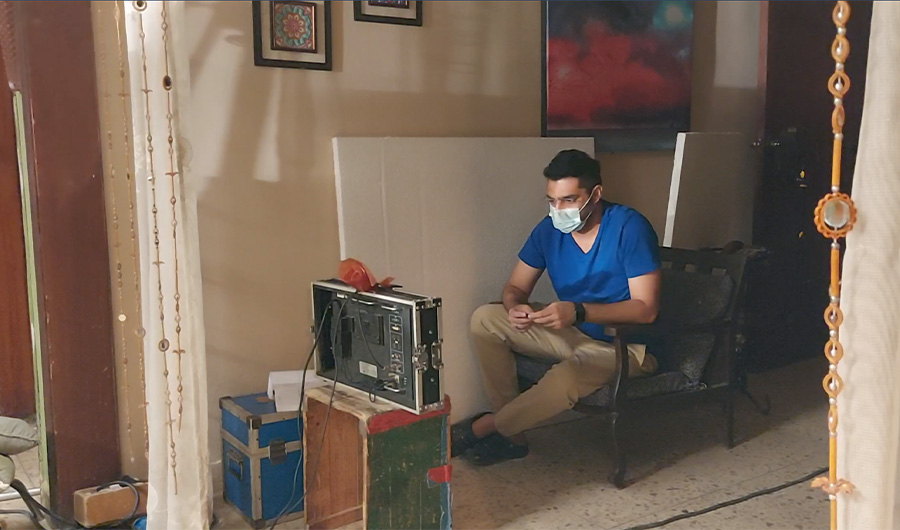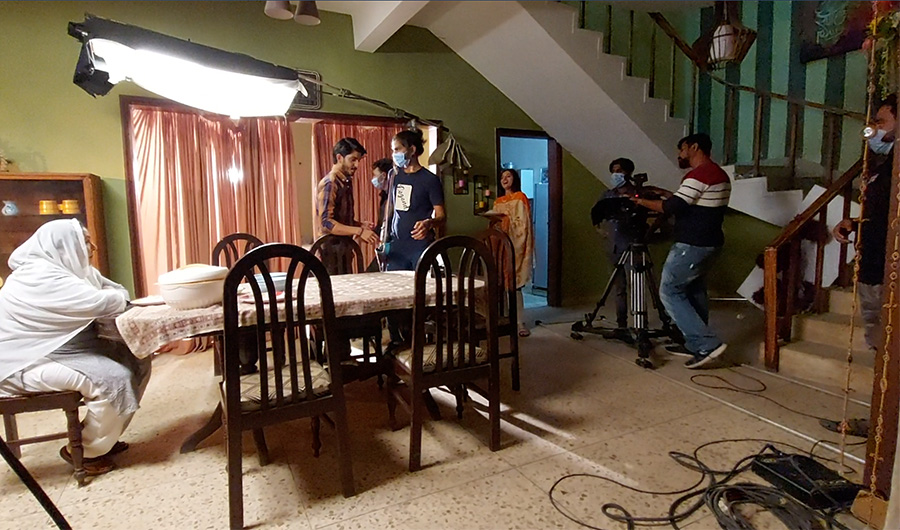KARACHI: At a residential house in Karachi’s upscale seaside locality of Clifton, dozens of crew members in face masks are shooting a scene for a new drama, “Dil Tanha Tanha,” one of the few productions to be filming as Pakistan has been hit by a second coronavirus wave.
Many popular television shows and series had to suspend production when Pakistan imposed coronavirus lockdowns in March. TV cameras slowly started rolling again in July when the country’s virus caseload eased. While the country has recently entered the second viral wave, with a continuing rise in infection cases, some projects keep filming because it is too costly just to stop.
While extensive coronavirus testing, daily symptom checks and other safeguards were supposed to be in place to allow actors and crew members to safely return to work, the reality on the ground does not always make it possible.
“It’s really very difficult,” Ali Masood, the director of “Dil Tanha Tanha” who started shooting in November told Arab News on the set last week. “I have ordered everyone to wear a mask, regularly sanitize their hands and try to keep their distance as much as they can.”

"Dil Tanha Tanha" director Ali Masood on set in Karachi on November 18, 2020. (AN photo)
While the director himself, sound engineers and cinematographers were wearing three-layer masks, actors could not do so.
“Obviously, after the scene they use masks,” Masood said. He also tried to design the set to keep them sitting in some reasonable distance.
On the set, three actors were at a dining table. Although everything was shot quickly, with no retakes, lead actor Mohsin Abbas Haider said keeping distance was not easy, especially as the drama revolving around family affairs included scenes in which a character would have to hug their parents.
“It is indeed very difficult time for everyone and especially the drama industry,” he said.
“We are trying our best to create a safe and healthy environment. When we come on shoot there is a guy at the gate holding a sanitizer and thermometer ... If we observe someone is coughing, sneezing or showing any symptoms of COVID, we give him or her a leave.”

"Dil Tanha Tanha" crew members prepare for shooting on set in Karachi on November 18, 2020. (AN photo)
Makeup artist Astel said he knew that much more responsibility has now been placed on him as his tasks require him to be physically close to the artists.
“It is my duty to get myself sanitized properly at the start of the work every day. I also keep separate utensils and kits for every artist and strictly wear masks when doing makeup and try to maintain reasonable distance.”
He is aware that these precautions may not be enough, but the show must go on if those working on the set want to survive.
“These days are very dangerous,” he said. “(But) we have to work. We can’t survive without going to work.”
On the set of another drama, “Raqse Bismi” which is going to be aired by early next year, crew members are also struggling with health protocols. They complain of being unable to breath in face masks, especially in the heat of camera lights, producer Shazia Wajahat told Arab News.
“Luckily, we have not found any (coronavirus) case on our set, but whenever I heard someone coughing or sneezing or having a fever I sent them home and asked them to come after completing their quarantine,” she said, adding that most of the actors, however, have already had the infection before shooting resumed and are now “corona free.”
But they still try to remain cautious, the producer said. “There is a daily spray of sanitizers and bleach on sets. After every hour, I make sure that they have sprayed washrooms with sanitizers properly specially taps and handles.”
“We are already doing it at a very slow pace and shoot only five to six scenes maximum daily.”
Director Wajahat Rauf said they have been trying to keep actors at a reasonable distance but if characters need to get closer, then they take “this calculated risk.”
The lead actor, Imran Ashraf, admitted that of all crew members actors are highest risk.
“But we take this risk if we want to work,” he said, adding that keeps a bottle of sanitizer with him, which he sprays on himself and others.
Concerned about safety, he decided to shoot one drama at a time and may wait before he accepts another role.
“After ‘Raqse Bismil’ I would think about doing any other project,” he said. “It might be next year.”
















